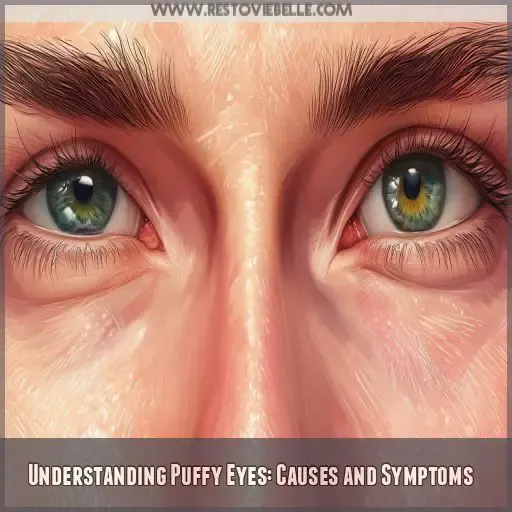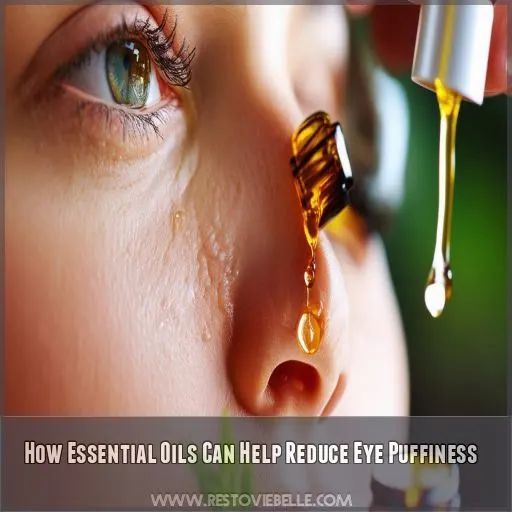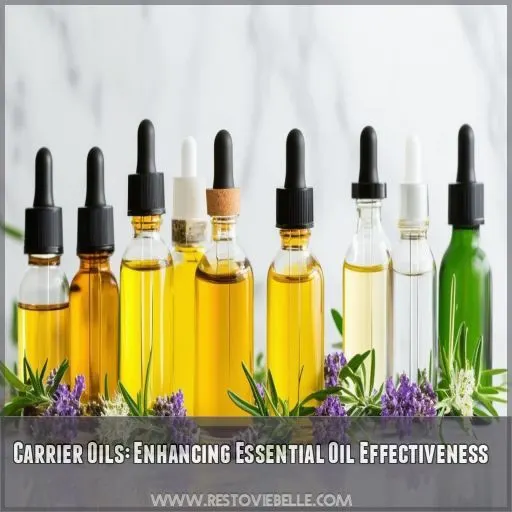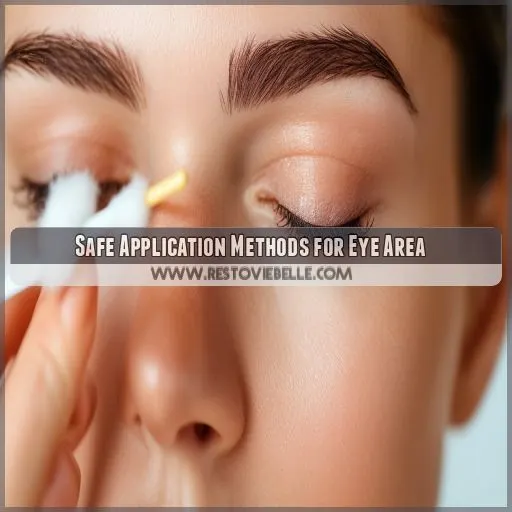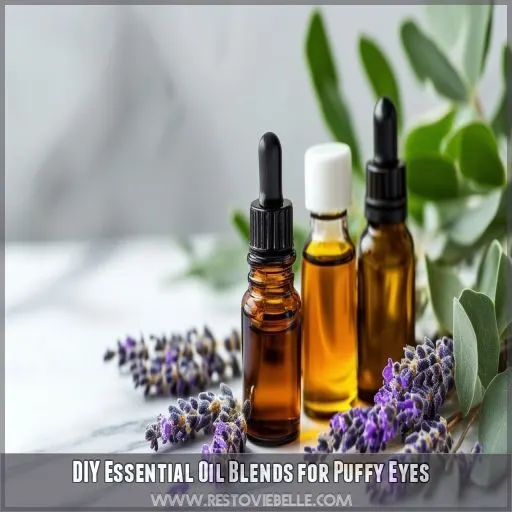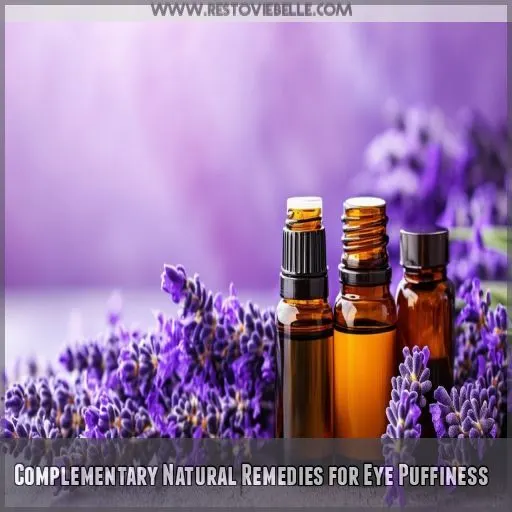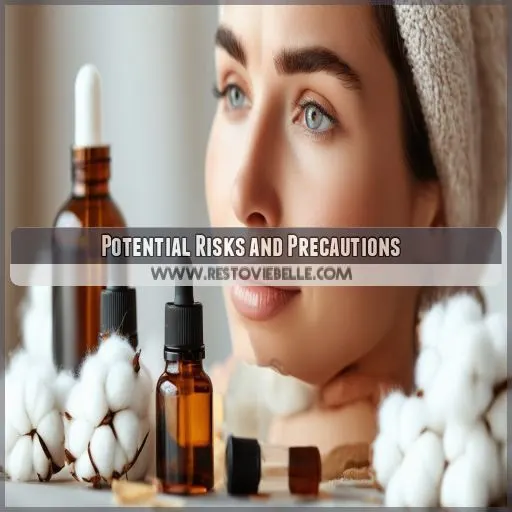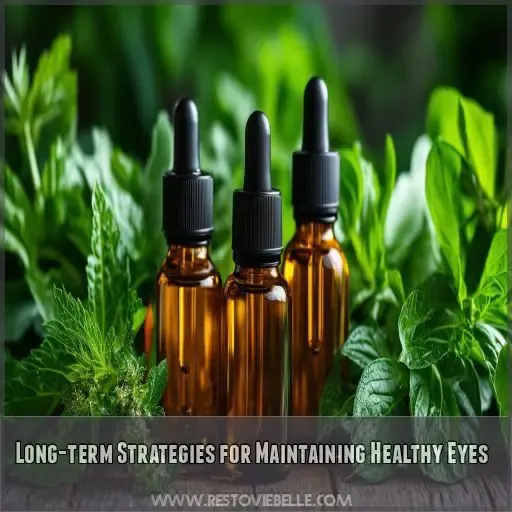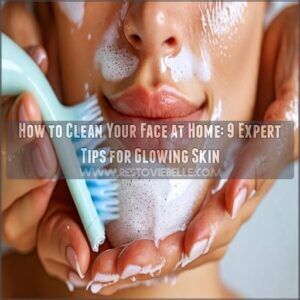This site is supported by our readers. We may earn a commission, at no cost to you, if you purchase through links.
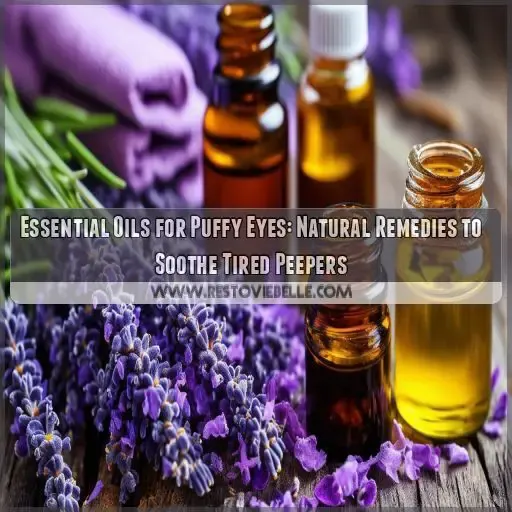 Think about your eyes as a flowering plant drooping down at the end of a long day. You’re not alone in looking for a solution to rid yourself of the puffiness.
Think about your eyes as a flowering plant drooping down at the end of a long day. You’re not alone in looking for a solution to rid yourself of the puffiness.
Essential oils for puffy eyes grant you an honest, natural solution for the pampering of tired peepers. Such botanical wonders will harness the power of nature to decrease inflammation and rejuvenate your gaze.
You will learn how to apply these potent extracts safely, create blends independently, and enhance their effects with lifestyle adjustments.
Discover how essential oils can help you reclaim bright, revitalized eyes and confidently face the world.
Table Of Contents
- Key Takeaways
- Understanding Puffy Eyes: Causes and Symptoms
- How Essential Oils Can Help Reduce Eye Puffiness
- Carrier Oils: Enhancing Essential Oil Effectiveness
- Safe Application Methods for Eye Area
- DIY Essential Oil Blends for Puffy Eyes
- Complementary Natural Remedies for Eye Puffiness
- Potential Risks and Precautions
- Long-term Strategies for Maintaining Healthy Eyes
- Frequently Asked Questions (FAQs)
- What is the fastest way to get rid of puffy eyes?
- Does frankincense help with under-eye bags?
- What oil is good for puffy face?
- What essential oils reduce swelling?
- Can essential oils replace medical treatments for eye conditions?
- How long does it take to see results?
- Are there age restrictions for using essential oils?
- Can essential oils prevent future eye puffiness?
- Are organic essential oils more effective for puffy eyes?
- Conclusion
Key Takeaways
- Essential oils like chamomile, rose, and sandalwood are nature’s little miracles for tired peepers, packing a punch against puffiness with their anti-inflammatory superpowers. Who knew Mother Nature could be such an eye-opening ally?
- Carrier oils aren’t just wingmen for essential oils – they’re the unsung heroes of the puffy eye battle. Coconut, jojoba, and almond oils bring their A-game, moisturizing and soothing while helping those powerhouse essential oils work their magic.
- DIY eye serum, anyone? Whip up your own cooling concoction with cypress and frankincense oils, or go for a soothing compress with lavender and chamomile. It’s like a spa day for your eyes, minus the cucumber slices and fancy robes.
- Remember, Rome wasn’t built in a day, and neither is eye perfection. Pair your essential oil routine with lifestyle tweaks like catching more Z’s, staying hydrated, and giving your peepers a break from screens. Your future self (and selfies) will thank you!
Understanding Puffy Eyes: Causes and Symptoms
You can also get puffy eyes when you’re sleep-deprived, when you’re having allergies, or even when you have sinus problems. Swelling under the eye may also result from dehydration or poor nutrition, which can make consideration of the whole lifestyle essential in addressing this problem.
Lack of Sleep
You’ve probably experienced those mornings when your eyes feel puffy and swollen. Lack of sleep is often the culprit behind those tired peepers.
When you don’t get enough shut-eye, your body retains more fluid, leading to under-eye bags. This can also exacerbate dark circles, making you look exhausted.
Fortunately, essential oils and natural remedies can help combat these effects, restoring your eyes’ youthful appearance.
Allergies and Sinus Issues
When allergies strike, your eyes bear the brunt. Nasal congestion and sinus drainage can lead to puffy peepers, leaving you looking tired and feeling uncomfortable.
Essential oils like eucalyptus, fennel, lavender, cypress, and rose geranium offer natural alternatives to antihistamines. These botanical powerhouses boast decongestant properties that may help alleviate allergy triggers, reduce swelling, and soothe irritated eyes.
Dehydration and Diet
While allergies can be a cause, so do your diet and water intake. Dehydration and poor nutrition lead to tired, puffed-up peepers. To keep your eyes healthy and reduce the puffiness:
- Drink enough water during the day
- Reduce salt intake, which causes water retention.
- Add to your diet some foods rich in vitamins A, C, and E.
- Infuse some eye-friendly oils, such as coconut oil, almond oil, or jojoba oil, into your skincare routine.
How Essential Oils Can Help Reduce Eye Puffiness
Essential oils can be your natural allies in combating puffy eyes through their potent anti-inflammatory and circulation-boosting properties. By supporting lymphatic drainage and reducing inflammation, these botanical extracts work to soothe and refresh tired eyes, helping you look more awake and rejuvenated.
Anti-inflammatory Properties
Essential oils can be powerful allies in reducing eye puffiness due to their anti-inflammatory effects. When properly diluted, these botanical extracts work to soothe irritated skin and calm swelling around your eyes. Here’s a quick look at some top contenders:
| Essential Oil | Anti-Inflammatory Properties | Best For |
|---|---|---|
| German Chamomile | Soothes irritation | Sensitive skin |
| Rose Oil | Calms redness | Dry, mature skin |
| Sandalwood | Reduces swelling | All skin types |
Circulation-boosting Effects
Essential oils can boost circulation around your tired peepers, tackling those pesky under-eye bags. When applied with carrier oils, these potent botanicals diffuse into your skin, enhancing blood flow.
This increased circulation helps flush out toxins and reduce puffiness.
Try blending cypress, rosemary, or ginger essential oils with jojoba oil for a synergistic effect that’ll have your eyes looking bright and refreshed in no time.
Lymphatic Drainage Support
Essential oils can support lymphatic drainage, helping reduce puffy eyes. You’ll find oils like cypress and juniper berry particularly effective for this purpose.
Try gently massaging these oils (properly diluted) around your eyes, focusing on acupressure points. This technique, combined with facial massage and eye exercises, can work wonders.
Don’t forget to stay hydrated with herbal teas, too. It’s a holistic approach that’ll leave your eyes looking refreshed and wrinkle-free.
Carrier Oils: Enhancing Essential Oil Effectiveness
You will maximize the effect of essential oils on puffy eyes by mixing them with some carrier oil, such as coconut, jojoba, or almond oil. Such nourishing carriers not only dilute potent essential oils for safe use around the sensitive eye area but also bring even more skin-loving benefits to soothe and moisten tired peepers.
Coconut Oil
Coconut oil’s a powerhouse carrier for your essential oil eye serum. It’s easily absorbed, nourishing your skin while boosting the benefits of other oils.
This natural wonder can help soothe allergies and reduce puffiness around your eyes. Plus, it’s packed with health-promoting compounds that’ll keep your eye area looking fresh.
Jojoba Oil
Jojoba oil, another stellar carrier for your essential oil blends, closely mimics your skin’s natural sebum. This unique quality makes it an excellent choice for puffy eyes, offering anti-aging benefits too. Here’s why you’ll love jojoba:
- Non-greasy texture absorbs quickly
- Rich in vitamins E and B-complex
- Helps balance oil production
Its lightweight nature won’t clog pores, making it perfect for the delicate eye area. You’ll find jojoba oil complements your puffy eye treatments beautifully.
Almond Oil
Almond oil is a game-changer for your essential oil blends targeting puffy eyes. Its lightweight texture allows for quick skin absorption, making it ideal for the delicate eye area.
Rich in vitamin E and fatty acids, almond oil boosts eye health and hydration. It also has anti-inflammatory properties, helping to reduce puffiness.
You’ll love how this carrier oil enhances the effectiveness of your chosen essential oils while nourishing your tired eyes.
Safe Application Methods for Eye Area
When using essential oils around the eyes, proper dilution according to the guidelines is significant. Gently apply diluted oils around the eye area; don’t let the oil come in direct contact with your eyes, then gently pat for the oils to seep in without irritating that tender skin area.
Dilution Guidelines
When using carrier oils, follow the proper dilution instructions over the delicate area of the eyes. Maintain a 1 percent dilution rate by adding one drop of essential oil to every teaspoon of the carrier oil.
Apply gentle oils like lavender or chamomile, and only use this handmade serum twice a day, at most.
Patch Testing
Before using any of these recipes near your eyes, patch testing with the essential oils is necessary. It’s that easy to save yourself from potential irritation. Here’s how to do it:
- Mix a small amount of diluted oil
- Apply to inner forearm
- Wait for 24 hours
- Observe for any reactions
Patch testing will also pinpoint sensitivities and the proper dilution amount. Use quality ingredients, and if you have susceptible skin, consider alternative methods. Bottom line: Where peepers are concerned, it’s always better to be safe than sorry!
Proper Application Techniques
After conducting patch tests, there remain the applications of the essential oils. This is a step-by-step quick guide on how to apply them properly:
| Technique | Description |
|---|---|
| Dilution | Mix 2-3 drops oil with name carrier oil |
| Storage | Keep in the dark, cool place |
| Roll-on | Gently apply under eyes |
| Shelf life | Within 6 months |
| Commute/travel | Leak-proof containers are to be used |
DIY Essential Oil Blends for Puffy Eyes
You can create your own soothing eye treatments at home using essential oils. Try making a cooling eye serum with cypress and frankincense oils, or blend lavender and chamomile for a comforting eye compress to reduce puffiness.
Cooling Eye Serum Recipe
You’ll love this cooling eye serum recipe, which is so easy to whip up at home. To ensure you have the best quality oils and that they last long enough, always store your essential oils in a cool, dark area. Here’s what you’ll need:
- 5 drops cypress essential oil, circulation-enhancing
- 3 drops Frankincense Essential Oil (anti-inflammatory)
- 2 drops chamomile essential oil, calming
- 1 tablespoon Glycerin is a moisturizing base.
Mix everything in a little roll-on bottle. Shake well before every use. Gently apply around the eyes, and feel the difference instantaneously.
Soothing Eye Compress Blend
Create a soothing eye compress blend to combat tired eyes naturally. Mix these essential oils with a tablespoon of carrier oil:
| Essential Oil | Drops | Benefits |
|---|---|---|
| Lavender | 3 | Calming |
| Chamomile | 2 | Soothing |
| Eucalyptus | 1 | Cooling |
| Frankincense | 2 | Toning |
Soak a soft cloth in cool water, add a few drops of your blend, and gently place over closed eyes for 10-15 minutes. You’ll feel refreshed and rejuvenated in no time!
Complementary Natural Remedies for Eye Puffiness
While essential oils can work wonders for puffy eyes, you’ll enhance their effects by incorporating complementary natural remedies. Try applying a cold compress to your eyes, adjusting your diet to include more anti-inflammatory foods, and making lifestyle changes like improving your sleep habits and staying hydrated.
Cold Compress Techniques
Cold compress techniques are a quick and effective way to reduce eye puffiness. Here are four easy methods you can try at home:
- Cold packs: Apply a gel-filled eye mask for 10-15 minutes.
- Ice cubes: Wrap in a soft cloth and gently press against closed eyes.
- Frozen spoons: Place the curved side on your eyelids for instant relief.
- Chilled tea bags or cucumber slices: Rest these natural coolers on your eyes for 15 minutes.
These techniques constrict blood vessels, reducing swelling and promoting a refreshed appearance.
Dietary Considerations
While cold compresses do much good, it’s your diet that can make the maximum difference in terms of eye puffiness.
Include foods rich in vitamins A, C, and E to improve skin health. Cut down on excess salt intake, as it will retain water. Drink plenty of water throughout your day.
Fill up on anti-inflammatory foods like berries and leafy greens to combat puffiness from within.
Lifestyle Adjustments
Revamp your sleep hygiene to combat puffy eyes. Limit screen time before bed, allowing your peepers to relax. Practice stress management techniques like deep breathing or meditation to unwind. Stay hydrated throughout the day, sipping water regularly. Your diet plays a role too – cut back on salt and alcohol. These lifestyle tweaks can work wonders for tired, puffy eyes.
Potential Risks and Precautions
Always remember that some risks are involved with essential oils, even when they can be accommodating for puffy eyes. You should always consider your skin’s sensitivity or when you’re pregnant or lactating and check for possible interactions with any medications you’re using before using essential oils around your eyes.
Skin Sensitivity
While essential oils can work magic in the case of puffy eyes, there’s an element of skin sensitivity over which one can’t be careless. That sensitive skin around your eyes might be pretty different from the rest of your body. To ensure that it’s safe,
- Always dilute oils proper
- Always do a patch test before applying it fully.
- Watch for irritation and allergic reactions
- Don’t use if you have eczema or another form of sensitive skin like rosacea.
Remember that by being careful, you’ll reap all the benefits without the consequences of skin irritation and contact dermatitis.
Pregnancy and Breastfeeding
While essential oils can be soothing, pregnancy and breastfeeding require extra caution. Your body’s changing chemistry may react differently to oils, so it’s best to consult your healthcare provider before use.
Some oils, like clary sage and rosemary, should be avoided entirely during pregnancy.
If you’re nursing, be mindful that oils can transfer to breast milk.
Always prioritize safety for you and your little one.
Interactions With Medications
One should also be aware of the fact that there’s an interaction between essential oils and medication. Some may interact in your system with drugs to produce side effects, besides reducing their effectiveness.
Always consult your health professional before taking essential oils together with conventional medications, especially if you take blood thinners, diabetes medications, or antidepressants. Better safe than sorry!
Ensure you inform your healthcare provider of all your natural remedies to avoid risky contraindications.
Your health will thank you for being cautious.
Long-term Strategies for Maintaining Healthy Eyes
To keep your peepers healthy long-term, you’ll need to adopt some daily habits. Start with proper eyelid hygiene, gently cleansing your lids to prevent irritation and infections.
Manage your screen time wisely, taking regular breaks to reduce eye strain. Don’t forget to stay hydrated – your eyes need moisture too!
A nutrient-rich diet packed with vitamins A, C, and E can work wonders for eye health. Think leafy greens, colorful fruits, and omega-3 fatty acids.
Regular exercise isn’t just good for your body; it boosts circulation to your eyes as well. Try incorporating eye yoga or simple eye exercises into your routine.
Frequently Asked Questions (FAQs)
What is the fastest way to get rid of puffy eyes?
You can quickly reduce puffy eyes by applying cold compresses, like chilled tea bags or cucumber slices. Stay hydrated, elevate your head while sleeping, and limit salt intake. Gentle massage and eye exercises also help improve circulation.
Does frankincense help with under-eye bags?
Frankincense can indeed help with under-eye bags. Its anti-inflammatory properties reduce puffiness, while its astringent nature tightens skin. You’ll find it can improve circulation and promote cell regeneration, potentially diminishing those pesky bags over time.
What oil is good for puffy face?
You’ll find rosemary oil effective for reducing facial puffiness. It’s known to boost circulation and reduce inflammation. Mix a few drops with a carrier oil like jojoba, and gently massage it into your face for best results.
What essential oils reduce swelling?
You’ll find relief with these swelling-reducing powerhouses: lavender, chamomile, and peppermint. They’re your go-to allies for calming inflammation and easing puffiness. Don’t forget to dilute them properly before applying to your skin for best results.
Can essential oils replace medical treatments for eye conditions?
Much as one couldn’t view a garden as equivalent to a hospital, so too essential oils should #NeverReplace expected medical treatment for eye conditions. They’re complementary, not primary care. While oils may offer alleviation or some relief, it’s essential to see one’s doctor for proper diagnosis and treatment.
How long does it take to see results?
You’ll typically notice results within 1-2 weeks of consistent use. However, individual responses vary. For quicker effects, combine essential oils with lifestyle changes like improved sleep and hydration. Patience is key in your natural eye care journey.
Are there age restrictions for using essential oils?
An ounce of prevention is worth a pound of cure." You’ll find most essential oils are safe for adults, but caution’s key for children and pregnant women. Always dilute properly and consult a professional before using on young ones.
Can essential oils prevent future eye puffiness?
You can help prevent future eye puffiness with essential oils. They’ll boost circulation, reduce fluid retention, and soothe inflammation. Incorporate them into your daily routine, but remember, they’re not a magic fix—lifestyle changes are key too.
Are organic essential oils more effective for puffy eyes?
Ever wondered if organic means better? While organic essential oils may be purer, their effectiveness for puffy eyes isn’t necessarily superior. You’ll still want to focus on quality, proper dilution, and consistent use for the best results.
Conclusion
Imagine a puff-free eye world, just one of bright, riveting windows to the soul. Armed with essential oils for puffy eyes, you’re ready to embrace change in those jaded peepers and turn them into resplendent windows to the soul.
In using these natural remedies and making them part of your daily routine, not only will you be soothing immediate puffiness but also moving down the pathway of long-term health for the eyes.
Keep in mind safety at all costs, experiment with blends, and adopt complementary lifestyle changes.
Let the journey begin for brighter, fresher eyes—unleash the power of nature and take a gleaming gaze.

